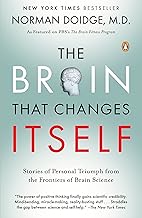
Why We Sleep: Unlocking the Power of Sleep and Dreams
Matthew Walker, Steve West, et al.
4.7 on Amazon
19 HN comments

Thinking, Fast and Slow
Daniel Kahneman, Patrick Egan, et al.
4.6 on Amazon
16 HN comments

The Design of Everyday Things: Revised and Expanded Edition
Don Norman
4.6 on Amazon
15 HN comments

The Body Keeps the Score: Brain, Mind, and Body in the Healing of Trauma
Bessel van der Kolk M.D.
4.8 on Amazon
9 HN comments

The Black Swan: Second Edition: The Impact of the Highly Improbable: With a new section: "On Robustness and Fragility" (Incerto)
Nassim Nicholas Nicholas Taleb
4.5 on Amazon
8 HN comments

The Righteous Mind: Why Good People Are Divided by Politics and Religion
Jonathan Haidt and Gildan Media, LLC
4.6 on Amazon
8 HN comments

The War of Art: Break Through the Blocks and Win Your Inner Creative Battles
Steven Pressfield and Shawn Coyne
4.6 on Amazon
5 HN comments

How to Change Your Mind: What the New Science of Psychedelics Teaches Us About Consciousness, Dying, Addiction, Depression, and Transcendence
Michael Pollan and Penguin Audio
4.7 on Amazon
4 HN comments

The Brain That Changes Itself: Stories of Personal Triumph from the Frontiers of Brain Science
Norman Doidge
4.7 on Amazon
4 HN comments

The Tipping Point: How Little Things Can Make a Big Difference
Malcolm Gladwell and Hachette Audio
4.4 on Amazon
4 HN comments

Maps of Meaning
Jordan B. Peterson and Random House Audio
4.8 on Amazon
3 HN comments

Man's Search for Meaning
Viktor E. Frankl , William J. Winslade, et al.
4.7 on Amazon
3 HN comments

How Emotions Are Made: The Secret Life of the Brain
Lisa Feldman Barrett, Cassandra Campbell, et al.
4.6 on Amazon
3 HN comments

Humankind: A Hopeful History
Rutger Bregman , Erica Moore, et al.
4.7 on Amazon
3 HN comments

Emperor of All Maladies: A Biography of Cancer
Siddhartha Mukherjee
4.8 on Amazon
3 HN comments
psysharponJuly 12, 2021
ternonApr 12, 2021
For other relevant scientific perspectives, I recommend looking into the theory around "memory reconsolidation."
- Kaj Sotala does a good job of summarizing an important book in the field here: https://www.lesswrong.com/posts/i9xyZBS3qzA8nFXNQ/book-summa...
- How Emotions are Made also provides a perspective from neuropsychology on what's going on: https://www.amazon.com/How-Emotions-Made-Lisa-Barrett/dp/132....
- The Polyvagal Theory stuff mentioned in the article is also great, and some classic accessible books on the overall topic include The Body Keeps the Score and Waking the Tiger.
I'm personally a fan of a technique called Emotional Resolution (EmRes), which is notably simple and effective, and that you can learn to apply to yourself after a 90 minute course, but there are many other approaches: Organic Intelligence, somatic experiencing, cranio-sacral therapy, bioenergetics and core energetics, and many more. Effective self-therapy methods include Core Transformation, Focusing, and "self-therapy".
Keywords to search for are: "somatic therapy," "body work," "energy work" or "energy medicine."
crazygringoonApr 7, 2021
And the fact is that humans can't reliably identify emotions from photographs, so there's zero chance for AI.
While I don't agree with much of what she writes, the psychologist Lisa Feldman Barrett gives an excellent overview of why at the start of her book "How Emotions are Made".
But a short explanation is that 1) emotions are expressed not just with the face but with the whole body, 2) the expression of emotion is a sequence of changes over time that can't be captured in a single frame, 3) there is extreme overlap in the expression of emotions (e.g. a seemingly grimaced look could either be painful anguish or ecstatic surprise) and 4) while we do have instinctual expressions for emotions (smile/frown/etc.), we learn culturally how and when to hide, show, fake, or otherwise modify these by habit, as well as consciously do so for our immediate purposes.
So we humans obviously do recognize emotions in others, but we do so with a huge variety of cues, we still frequently get it wrong, and we do a far better job when we share the same culture, and also know the individual person well. (Think how some people express anger with aggressive shouting, others by silently withdrawing.)
Most evidence for the idea that emotions can be identified (and cross-culturally) comes from the research of Paul Ekman, but this was limited to 6 "basic" emotions with photographs of highly exaggerated/stylized faces performed by actors. It has no relevance to whether real-life, non-"staged" emotions can be reliably detected.
So any AI products designed to supposedly recognize emotions are necessarily snake oil. I assume they are reliably measuring facial expressions, but facial expressions simply cannot be mapped to actual emotions in any kind of reliable way in the real world.